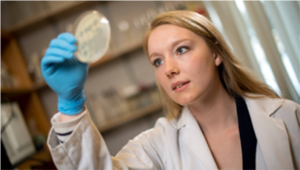
Microbiology is the study of microscopic forms of life such as bacteria and viruses and the immune response to these microorganisms. It is a broad, multi-disciplinary field using techniques of genetics, chemistry, biochemistry, physiology, ecology, and pathology to study the biology of microorganisms from gene expression at the molecular level to the composition of populations of microorganisms.
Exciting discoveries involving microorganisms have important and far reaching implications for biotechnology, molecular biology, medicine, public health and the environment. AIDS, COVID-19, and other important diseases present new and exciting challenges for microbiologists in the public health field; and advances in recombinant DNA technology, immunology, and the ability to manipulate the biology of microbial cells have revolutionized science and thrust microbiology into the center of the rapidly expanding arena of biotechnology.
Requirements for the Bachelor of Science degree in Microbiology at the University of Maine are satisfied with completion of at least 120 degree hours with a cumulative grade point average of at least a 2.0 overall in microbiology courses.
Requirements of the Microbiology Degree Program:
English:
- ENG 101 College Composition (3 cr)
Humanities and Social Sciences:
- Elective Courses (18 cr)
Mathematics:
- MAT 126 Calculus I (4 cr)
Physics:
- PHY 111/121 Physics I (4 cr)
- PHY 112/122 Physics II (4 cr)
Chemistry:
- CHY 121 Introduction to Chemistry (3 cr)
- CHY 123 Introduction to Chemistry Laboratory (1 cr)
- CHY 122 The Molecular Basis of Chemical Change (3 cr)
- CHY 124 The Molecular Basis of Chemical Change (1 cr)
- CHY 251 Organic Chemistry Lecture I (3 cr)
- CHY 252 Organic Chemistry Lecture II (3 cr)
- CHY 253 Organic Chemistry Laboratory I (2 cr)
- CHY 254 Organic Chemistry Laboratory II (2 cr)
Biochemistry:
- BMB 360 Biochemistry for Molecular & Biomedical Sciences (3 cr)
- BMB 464 Analytical and Preparative Biochemical Laboratory Methods (4 cr)
Molecular Biology:
- BMB 280 Cellular and Molecular Biology (3 cr)
- BMB 400 Molecular Genetics (3 cr)
Microbiology:
- BMB 150/HON 150 Phage Genome Discovery I (4 cr)
- BMB 155/HON 155 Phage Genome Discovery II (4 cr)
- BMB 300 General Microbiology (3 cr)
- BMB 305 Microbiology Laboratory (2 cr)
- BMB 420 Infectious Disease (3 cr)
- BMB 421 Infectious Disease Laboratory (2 cr)
- BMB 480 Seminar in Molecular and Biomedical Sciences (2 cr)
- BMB 491 Molecular and Biological Sciences Research (6 cr)
BMB 400-Level Electives: (9 cr)
- BMB 409 – Applied Microbiology (3 cr)
- BMB 415 – Microbiology of Historical Plagues (1 cr)
- BMB 440 – Introductory Immunology (3 cr)
- BMB 455 – Virology (3 cr)
- BMB 475 – Virus-Host Cell Interactions Discovery Laboratory (3 cr)
Science and Program Electives: (10 cr)
Free Electives: (12 cr)
